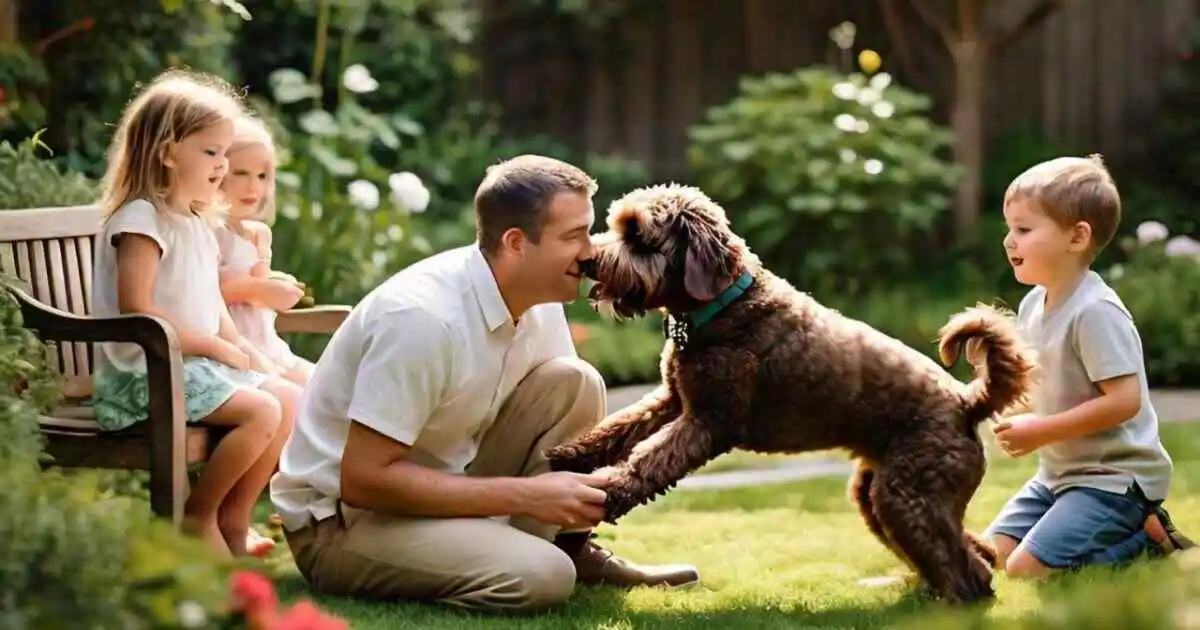Are you considering adding a chocolate mini Goldendoodles to your family? These adorable, friendly, and intelligent dogs make fantastic pets. A chocolate mini Goldendoodle is a crossbreed between a Miniature Poodle and a Golden Retriever, known for its small size, curly coat, and rich chocolate color.
This guide will cover everything you need to know about chocolate mini Goldendoodles, from their temperament to care tips, ensuring you make an informed decision. Chocolate mini Goldendoodles are celebrated for their hypoallergenic coats, making them an excellent choice for families with allergies.
Their small stature makes them perfect for apartment living, while their playful and affectionate nature ensures they are great with children. Whether you’re looking for a loyal companion or a playful friend for your kids, the chocolate mini Goldendoodles ticks all the boxes.
What Makes Chocolate Mini Goldendoodles Special?
Chocolate mini Goldendoodles have a unique charm that sets them apart from other breeds. Their chocolate-colored coats and expressive eyes make them irresistibly cute. They inherit the intelligence and trainability of both the Poodle and the Golden Retriever, making them quick learners.

These dogs are not just beautiful; they are also highly adaptable and thrive in various living environments, from spacious homes to cozy apartments.
Temperament and Personality
One of the main reasons chocolate mini Goldendoodles are so popular is their delightful temperament. They are known for being friendly, social, and affectionate. These dogs love to be around people and are great with kids and other pets. Their playful nature means they enjoy interactive playtime, but they are also content to snuggle up with you on the couch. Their loyalty and gentle nature make them excellent therapy dogs as well.
Comparing Coat Colors: Chocolate vs. Other Colors
While chocolate mini Goldendoodles are known for their rich, dark brown coats, they also come in a variety of other colors, including cream, apricot, and black. Each color has its own appeal, but the chocolate variety is often preferred for its unique, striking appearance.
- Chocolate Goldendoodle: Their deep, luscious coats are eye-catching and less common, making them stand out in a crowd. They often have dark eyes that contrast beautifully with their coat.
- Cream and Apricot Goldendoodle: These lighter shades give the dogs a softer, more delicate look. They tend to show dirt less prominently but may require more frequent baths to keep their coats looking fresh.
- Black Goldendoodle: The black coat is sleek and shiny, giving these dogs a sophisticated appearance. Black coats can be more forgiving of minor dirt and debris, making grooming slightly easier.

Care and Maintenance
Owning a chocolate mini Goldendoodle comes with responsibilities, especially when it comes to grooming and health care. Their curly coats require regular brushing to prevent matting and occasional trips to the groomer. Regular vet check-ups, a balanced diet, and ample exercise are crucial to keeping your Goldendoodle healthy and happy. Their diet should consist of high-quality dog food, rich in nutrients to maintain their shiny coat and overall well-being.
Training Your Chocolate Mini Goldendoodle
Training a chocolate mini Goldendoodle can be a rewarding experience due to their high intelligence and eagerness to please. Positive reinforcement techniques work best, and early socialization is key to developing a well-behaved dog.
Obedience training, along with fun tricks and activities, can help strengthen your bond with your pet. Enrolling them in puppy classes can also provide a great opportunity for socialization and learning basic commands.
Health Considerations
Like all breeds, chocolate mini Goldendoodle can be prone to certain health issues. It’s essential to be aware of potential genetic conditions such as hip dysplasia, eye disorders, and allergies. Regular vet visits and a healthy lifestyle can help mitigate these risks, ensuring your furry friend lives a long, healthy life. Ensuring they get regular exercise can also prevent obesity and related health problems.

Finding a Reputable Breeder
If you decide that a chocolate mini Goldendoodle is the right fit for your family, it’s important to find a reputable breeder. Look for breeders who perform health screenings on their breeding dogs and who prioritize the health and temperament of their puppies. Avoid puppy mills and pet stores, and consider adopting from rescue organizations or shelters where many wonderful dogs are waiting for a loving home.
Conclusion
Chocolate mini Goldendoodles are a delightful addition to any family. Their charming appearance, combined with their friendly and intelligent nature, makes them the perfect pet for various lifestyles. By understanding their needs and providing proper care, you can enjoy many happy years with your chocolate mini Goldendoodles.
Whether you’re looking for a loyal companion or a playful family pet, this breed is sure to bring joy and love into your home. With the right care and training, your chocolate mini Goldendoodles will become an irreplaceable member of your family.
FAQs
What is the lifespan of a chocolate mini Goldendoodles?
Chocolate mini Goldendoodles typically have a lifespan of 10 to 15 years. With proper care, including regular vet check-ups, a balanced diet, and adequate exercise, they can live a long, healthy life.
Are chocolate mini Goldendoodles hypoallergenic?
Yes, chocolate mini Goldendoodles are considered hypoallergenic. Their curly coats tend to shed less than other breeds, making them a good choice for people with allergies. However, no dog is entirely hypoallergenic, so it’s essential to spend time with a Goldendoodles to ensure you don’t have a reaction.
How big do chocolate mini Goldendoodles get?
Chocolate mini Goldendoodles typically weigh between 15 to 35 pounds and stand about 13 to 20 inches tall at the shoulder. Their size can change based on how big their Poodle parent is.
How often should I groom my chocolate mini Goldendoodles?
Chocolate mini Goldendoodles should be brushed several times a week to prevent matting and tangling. They should also be professionally groomed every 6 to 8 weeks to keep their coat in good condition.
Are chocolate mini Goldendoodles good with children?
Yes, chocolate mini Goldendoodles are known for being friendly and gentle with children. Their playful nature makes them great companions for kids, and they are typically very patient and tolerant.
Do chocolate mini Goldendoodles require a lot of exercise?
While chocolate mini Goldendoodles are energetic and enjoy playtime, they do not require excessive exercise. Daily walks, playtime, and activities that challenge their minds are usually enough to keep them happy and healthy.
What is the difference between a chocolate mini Goldendoodles and other colored Goldendoodles?
The primary difference is the coat color. Chocolate mini Goldendoodles have a rich, dark brown coat, while other Goldendoodles can be cream, apricot, black, or other colors. The coat color does not significantly affect their temperament or care requirements.
Are chocolate mini Goldendoodles easy to train?
Yes, chocolate mini Goldendoodles are generally easy to train due to their high intelligence and eagerness to please. Positive reinforcement techniques work best, and starting training early is recommended.
Can chocolate mini Goldendoodles live in apartments?
Yes, chocolate mini Goldendoodles can adapt well to apartment living as long as they receive enough exercise and mental stimulation. Their small size and friendly nature make them well-suited to smaller living spaces.
What should I feed my chocolate mini Goldendoodles?
It’s recommended to feed them high-quality dog food that suits their age, size, and how active they are. It’s essential to provide a balanced diet rich in nutrients to maintain their overall health and coat condition. It’s important to consult with your veterinarian for personalized dietary recommendations.



